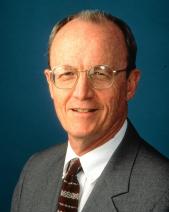Ed Reedy's tenure as director from 1998 to 2003 was marked by progress on several fronts. The $115 million in contract research awards recorded by GTRI during the 2002 fiscal year was the largest ever, leaving the organization in its best overall financial condition since the mid-1980s.
Backlogs were reduced. Reedy pushed hard to significantly increase the amount of internal funding for researchers who had ideas that needed critical testing and development before they could be presented to customers.
Under his leadership, GTRI adopted a new cost accounting standard for recovering indirect expenditures. The system allowed GTRI to recover funds that could be reinvested in new research initiatives and staff training.
33 Years of Contributions to GTRI
As a young research engineer at the Engineering Experiment Station in 1970, Reedy specialized in radar and supporting technologies. For 13 years, he headed the Radar and Instrumentation Laboratory, one of the largest research facilities at Georgia Tech.
Reedy also led GTRI units that applied and developed:
- Advanced signal processing,
- High-speed digital technology,
- Antennas,
- Electromagnetic propagation,
- Millimeter wavelength technology and applications, and
- Electronic counter-countermeasures.
He headed GTRI's Research Operations and served as associate director for four years before becoming director. In addition, he taught undergraduate and continuing education short courses, and consulted with industry and government agencies.
A fellow of the Institute of Electrical and Electronic Engineers, Reedy served on the group's national board, as well as on the board of the Georgia Tech Research Corporation and the Georgia Tech Advisory Board. He was named an honorary alumnus of Georgia Tech in 2004.
Reedy had planned to stay at the EES only about five or six years when he signed on 1970 as a research engineer. Thirty-three years later, he retired as director of GTRI and vice president of Georgia Tech.
Reedy continues to work as a consultant, and also spends a couple days a week at GTRI's Sensors Lab in Cobb County. He travels as well, representing Georgia Tech at various industry and professional functions.
"I wanted to get back to some of the technical work," he said. "I'm comfortable in that environment, and I enjoy doing it."

